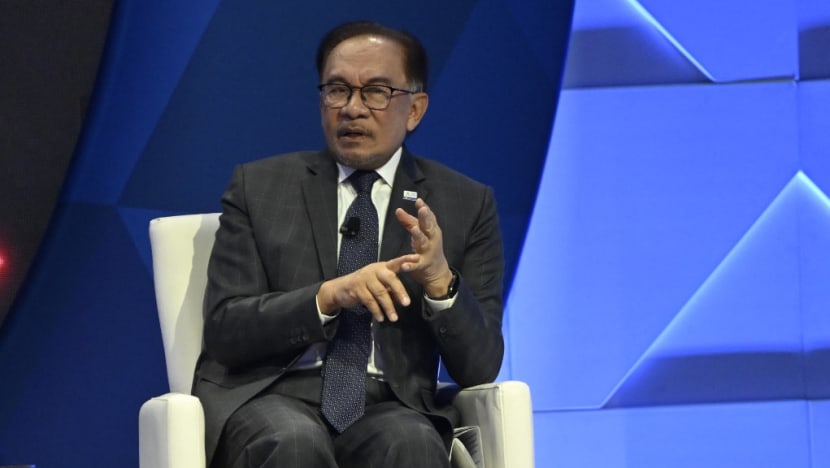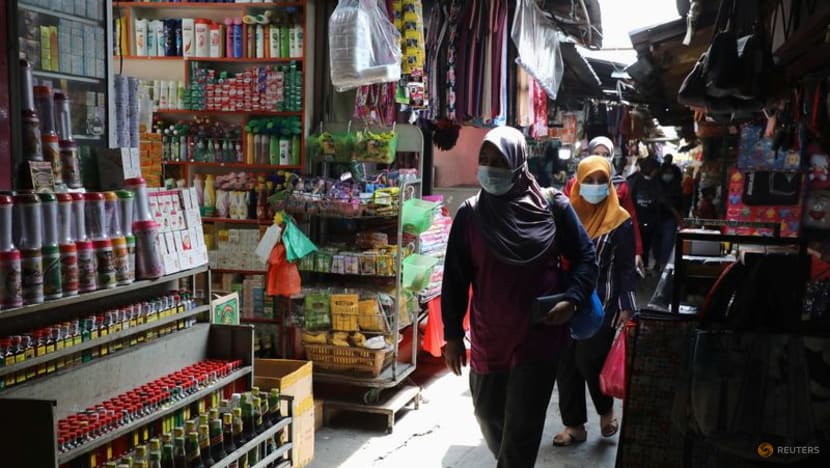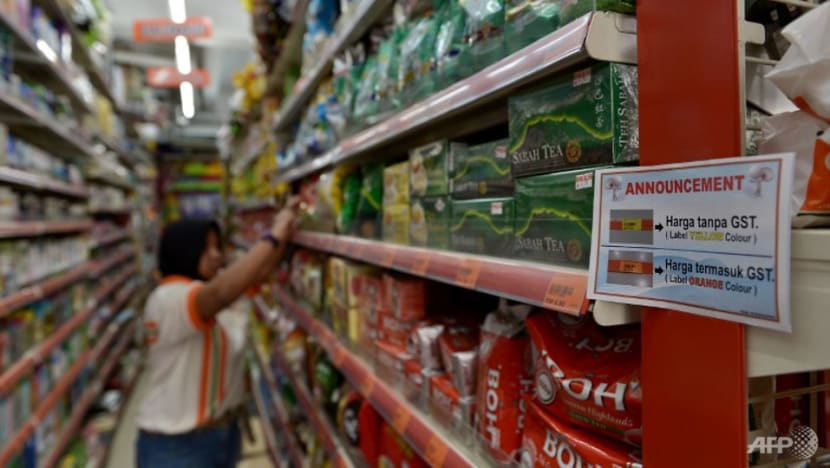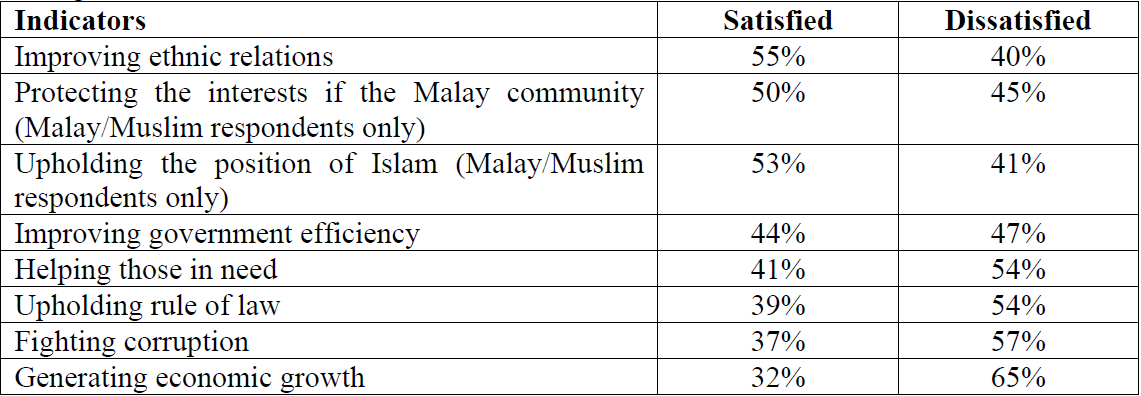
channelnewsasia.com | 23-Nov-2023: SINGAPORE: Malaysia Prime Minister Anwar Ibrahim’s approval rating has taken a hit one year after he assumed office, according to survey results by an independent pollster that along with other economic indicators cap a patchy report card for the premier.
Fifty per cent of Malaysian respondents gave Mr Anwar a positive approval rating, based on survey results released on Wednesday (Nov 22) by the Merdeka Center, down from the 68 per cent he scored in December 2022 after he was sworn in as the country’s 10th prime minister on Nov 24.
The dip in voter sentiment is largely driven by concerns over the economy and how it affects their livelihoods, Merdeka Center said in a statement, attributing it to anxiety over plans to cut subsidies and introduce new taxes.
But analysts told CNA Mr Anwar should continue to focus on implementing his economic and institutional reforms to put the country on a more solid financial footing over the long run, and also to stamp his political mark permanently beyond serving one or even two full terms.
Mr Anwar’s position as prime minister and his unity government remain intact one year on, they noted, even as some observers previously warned he might not last the full term given the political instability of the past few years.
Mr Anwar, who is also finance minister, took power only after a decades-long wait for the top job.
His planned succession when he was deputy to former prime minister Mahathir Mohamad in 2018 fell through following the Sheraton Move – a political manoeuvre to pull support for the Pakatan Harapan government that led to the PM’s resignation.
Mr Anwar’s previous stint as deputy prime minister – also under Dr Mahathir – in the 1990s ended in him being sacked and jailed on charges of corruption and sodomy.
“This is the right time to focus on longer-term structural issues – while there’s political stability in place, early on in his electoral term,” said Dr Tricia Yeoh, chief executive officer of Malaysia’s Institute for Democracy and Economic Affairs (IDEAS).
ECONOMIC REFORMS
Announcing his draft Budget for 2024 in October, Mr Anwar unveiled plans to introduce new capital gains and luxury taxes and gradually cut subsidies to bolster Malaysia’s fiscal position.
He also proposed increasing the sales and service tax (SST) in selected services and industries from 6 per cent to 8 per cent, although there was no mention of reintroducing the goods and services tax (GST) that some experts say is needed to further boost revenue.
But the survey shows these measures are proving to be unpopular at a time when people are struggling with a weakening local currency and rising costs of living.
While the latest figures show inflation is slowing year-on-year, consumer prices have steadily crept up since Mr Anwar took office. This is exacerbated by the depreciation of the ringgit, which in October dropped to its lowest value in 25 years.
Malaysia’s economy grew 3.3 per cent from a year earlier in the third quarter of 2023, but this is still short of the 5.6 per cent GDP growth rate it saw in the first quarter.
“In our opinion, the survey reflects the expectations held by the electorate on the administration to regenerate economic growth as well as address longstanding anxiety over inflation and tepid wage growth,” Merdeka Center said.
“Other issues that will shape public opinion into the future will include the form and substance of potential subsidies withdrawal, new taxation as well as revamp in the cash transfers programme.”

When it comes to cutting subsidies, one analyst said it is important for the government to communicate clearly to the public that the current system of blanket subsidies encourages a culture of wastage, and that targeted subsidies could free up funds better spent in areas like education and healthcare.
Mr Lee Heng Guie, an economist and executive director of the Socio-Economic Research Centre, said the government could also cushion the impact of subsidy rationalisation by handing out cash assistance, for instance in the form of vouchers, to those who need it.
“Assuming I do targeted subsidies, there’ll be some savings. The savings can go back into sectors that will have an effect on the economy,” he said.
To further stimulate economic growth, Mr Anwar could double down on policies that improve Malaysia’s investment climate, by making it easier to do business and being more “open” to using foreign labour to fill a shortage of skilled workers, Mr Lee said.
One area that Mr Anwar has seemingly excelled in is attracting foreign investment. The government said it has secured RM63.3 billion (US$13.6 billion) of foreign direct investment in the first half of 2023, compared to the RM74.6 billion net inflow for the whole of 2022.
Mr Lee said the premier’s slew of economic plans, like the National Energy Transition Roadmap, the Malaysia Madani framework and the mid-term review of the 12th Malaysia Plan, coupled with political stability will be crucial in wooing even more foreign investment.
“Get on with it, implement it and let the impact be felt on the ground, because we still face a lot of risks in the global economy,” he added, stressing that Malaysia’s export-driven economy remains vulnerable to external shocks.
Moving forward, Mr Anwar and his government need to “quickly deliver” on their economic plans, said Dr Yeoh from IDEAS.
“The administration will need to translate these into actionable items, translating them into a pipeline of economic activity that is clearly visible to industry,” she said, urging the government to identify potentially competitive sectors beyond the semiconductor industry.
“Developing ecosystems and sectors of economic priority will be key.”

Mr Anwar could also be bolder in introducing measures to correct economic structural failures of the past, Dr Yeoh said, calling for the reintroduction of the GST as one way of increasing Malaysia’s revenue base.
“Fiscal consolidation is required if we are to increase our revenue base to spend on longer-term developmental objectives including in education and healthcare,” she said.
In 2018, then-prime minister Dr Mahathir scrapped the GST to fulfil an electoral promise, despite the tax contributing more than 18 per cent of the government’s revenue in 2017. He subsequently replaced it with the more moderate SST.
Dr Yeoh acknowledged that it will be “challenging” to reintroduce GST, and that the government should first engage all stakeholders, including civil society organisations, industry experts and think tanks.
“I believe the public will be receptive to it if the communications are done correctly this time around,” she said.
INSTITUTIONAL REFORMS
Beyond the economy, Dr Yeoh said Mr Anwar could expedite the institutional reforms he has mentioned but without a “clear roadmap” towards the final goal, like the separation of the Office of the Attorney General and Public Prosecutor.
Previous administrations – like the one under former prime minister Ismail Sabri Yaakob – have tried studying this move, but failed to produce anything substantial.
Another political reform that Mr Anwar has talked about without “much movement on” is the Political Financing Act, Dr Yeoh said.
Progress on enacting the law – also started under Mr Ismail Sabri – was included under Mr Anwar’s 12th Malaysia Plan mid-term review and is expected to prevent influential figures or big corporations from exploiting donations to political parties.
Dr Awang Azman Awang Pawi from Universiti Malaya agreed, telling CNA that the laws around political financing need to be clearer as well as more specific and transparent.
The appointment of key positions in the civil service, like in the Election Commission as well as the Malaysian Anti-Corruption Commission, should also go through a parliamentary committee, he said.
Professor James Chin at the University of Tasmania said Mr Anwar should reshuffle his Cabinet as there is a “general consensus” in Kuala Lumpur and other parts of the country that his government is not performing.
“He needs to do it very soon because he’s got quite an ambitious agenda. The big thing now is that he’s trying to deal with the subsidy problem. This requires the government to work cohesively and the government is not doing that,” he said.
In the latest Merdeka Center survey, the unity government scored an approval rating of 41 per cent, down from 54 per cent in December 2022.
Sixty per cent of respondents also said they think the country is heading in the wrong direction, with the primary reasons being economic issues (56 per cent), political instability (13 per cent) and poor administration (9 per cent).

GOING FORWARD
Despite that, it is worth noting that Mr Anwar’s government has had to contend with an opposition keen on playing the race and religion card, said BowerGroupAsia director Adib Zalkapli.
While the unity government managed to retain the status quo after the six-state elections in August, it failed to win back the Malay vote as the opposition gained inroads in some states.
“Anwar’s biggest problem is he is the first prime minister to face an almost all Malay-Muslim opposition front and the fact that the opposition has been harping on racial and religious issues,” Mr Adib said.
“Naturally, the government has to respond to these issues, somewhat distracting them from governing.”
Mr Anwar, still in the early stages of his five-year term and thus better shielded from voter sentiment, should continue focusing on reviving Malaysia’s economy and improving its fiscal position, Mr Adib said.
“At the end of his second year, it will be difficult or even impossible to introduce any form of subsidy rationalisation, as Malaysia, just like other similar parliamentary democracies, will be in election season,” he predicted.
But Dr Anthony Dass, economic advisor at the KSI Strategic Institute for Asia Pacific, told CNA that the current challenges, ongoing uncertainties and high expectations suggest that Mr Anwar’s reforms will need about two years from 2024 to be implemented.
Among the challenges are potential political manoeuvres affecting the unity government’s two-thirds majority in parliament.
For instance, the unity government lost this majority after former Malaysian United Democratic Alliance president Syed Saddiq Syed Abdul Rahman pulled out of the ruling coalition. The majority was seemingly restored when four opposition MPs recently pledged support for Mr Anwar.
“Despite his two-thirds majority, mounting challenges from the political side may pose hurdles for Anwar to achieve economic and fiscal reforms that are necessary to create a more robust environment for the country’s future growth,” he said.
“And any lack of political support is likely to frustrate both businesses’ and people’s expectations.”
